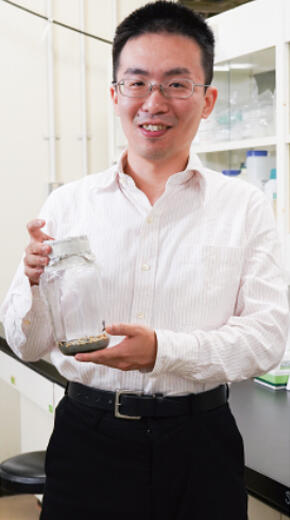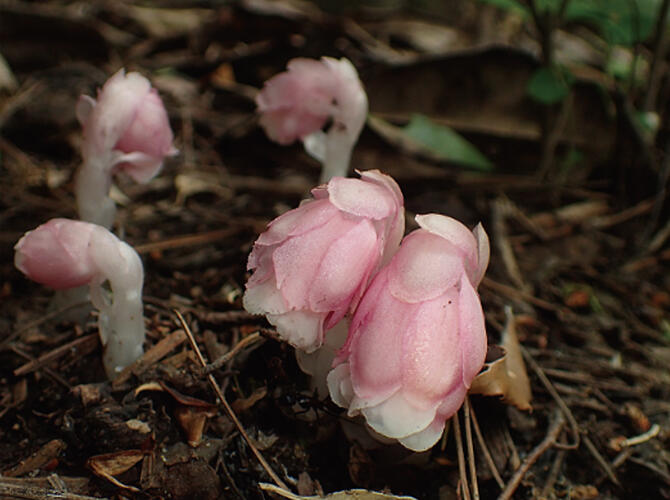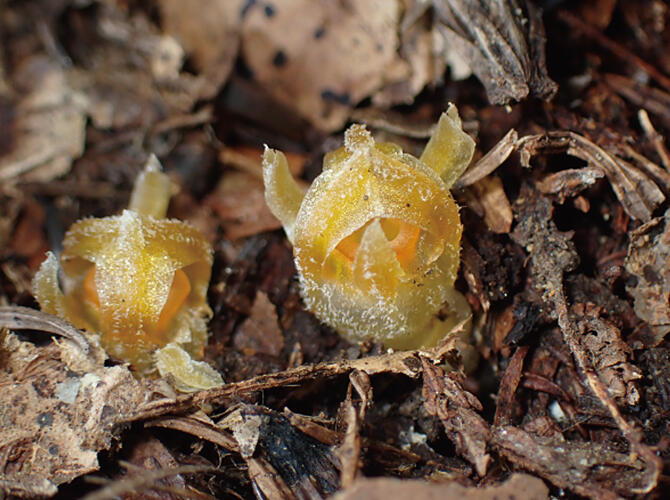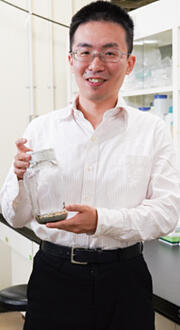
Professor (Outstanding Professor), Graduate School of Science, Department of Biology, Kobe University
Q1. What motivated you to pursue biology?
A1. Observing plants and insects in Kasugayama and finding mysterious "trickery and conflict."
Ever since I can remember, I have loved living things and observed various plants and insects in the Kasugayama Primeval Forest near my house. Even after returning home, I would be absorbed in reading illustrated dictionaries of biology every day and thought I would become a biology researcher in the future.
My university research on parasitic plants led me to develop a strong interest in the parasitic and symbiotic relationships between plants and animals. In particular, a mycoheterotrophic plant named "Ginryo-so" (Monotropastrum humile), which had stopped photosynthesis in the process of evolution, was a mystery to me. Mycoheterotrophic plants "trick" fungi by depriving them of nutrients such as nitrogen and sugars, while providing nothing to the fungi. Normal plants give less benefits when they receive less from the other side. It makes you wonder why fungi tolerate exploitation. To clarify this "mechanism of trickery and conflict," I am undertaking research from a range of perspectives, such as morphology, ecology, and genetics.

Q2. Which of your achievements is particularly memorable?
A2. Rediscovery of the "fairy lantern," thought to be extinct with support from collaborators throughout Japan.
The discovery of a new species of "Ginryo-so" (Monotropastrum humile), which captured my attention to the wonders of plants that stopped photosynthesis, is another recent and memorable achievement. However, an awe-inspiring achievement is the rediscovery of the mycoheterotrophic plant "Kobetanuki no Shokudai," which we named a new species in 2018. This plant, also known as the "fairy lantern," was collected in Kobe City in 1992 and kept in a museum as the only specimen in the world with a part of the flower missing.
The collection site was thought to have disappeared owing to development, and "Kobetanuki no Shokudai" was also thought to be extinct. That is why I still remember the surprise and excitement I felt when I happened upon this beautiful plant growing in the wild in 2021. The great response from the media and the general public in Japan and abroad has increased the desire to clarify the actual state of plants that have stopped photosynthesis, including the aforementioned mysterious plant.
However, in many cases, plants that have stopped photosynthesis parasitize fungi that live in symbiosis with living plants, making their cultivation difficult. Of course, conducting research in the laboratory is a great advantage, so we are also working hard to build cultivation systems. However, many things can only be learned in the field, making fieldwork essential. Nowadays, it is difficult for me to go to the field as often as I did when I was a university student; however, thanks to my collaborators throughout Japan, I am able to conduct my research efficiently. In return of these favors, I am also working on the conservation of endangered plants and the natural environment.

Q3. What would you like to say to aspiring researchers?
A3. Develop a "discerning eye," and have a unique perspective and enthusiasm.
Recently, there have been increasingly more opportunities for high school students to conduct specialized research and experiments. However, research can be carried out even after entering university, so I would like students to develop a "discerning eye" first. Especially in research dealing with nature, it is important to observe the subject thoroughly, which often leads to great discoveries. If you steadily and carefully pursue your interests, you will surely find interesting things and ask new questions. I hope you have a unique perspective and enthusiasm for daily activities.
(TEXT: Manami Yokoi)

Profile
Kenji Suetsugu
Born in Nara Prefecture
In 2014, completed a doctoral course at the Graduate School of Human and Environmental Studies at the Department of Interdisciplinary Environment, Kyoto University. Ph.D., Kyoto University (Human and Environmental Studies)
After serving as Assistant Professor at the Hakubi Center for Advanced Research of Kyoto University and as a specially appointed lecturer for the Biodiversity Course of the Department of Biology, Graduate School of Science, Faculty of Science, Kobe University, he has been in his current position since 2022. Served as a PRESTO researcher since 2021.




